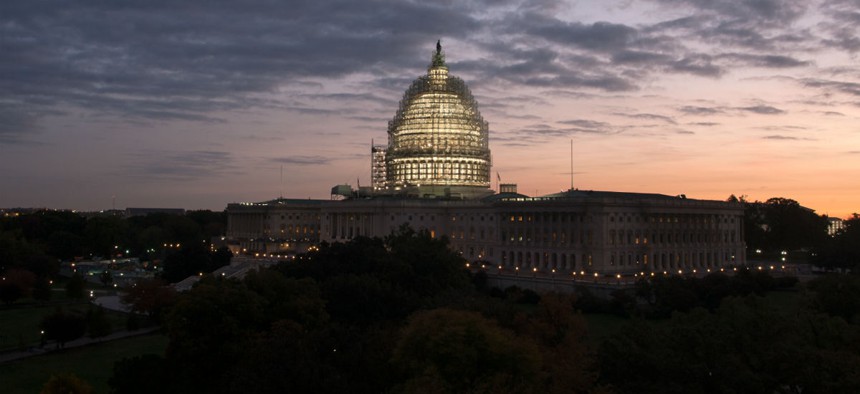
Architect of the Capitol
Senate to Vote on Limiting Syrian Refugees
The chamber is set to tackle a hot-button bill that already passed the House.
Following a three-day Republican retreat in Baltimore last week in which the House pitched big ideas and complained about the slow pace of progress in the Senate, senators will return alone to Washington on Tuesday to take up one of the bills their House colleagues passed last November.
The Senate will vote Tuesday night to open debate on a House-passed bill limiting the immigration of Syrian refugees to the United States, amid simmering concerns about the threat of potential terror attacks.
The bill, which passed the House in November on a veto-proof vote of 289-137, came on the heels of the terror attack in Paris, in which at least one Syrian refugee stands accused, but before the attacks in San Bernardino, California, that killed 14 in early December.
But although the bill garnered the support of 47 Democrats in the House, it faces a filibuster threat from the minority party in the Senate. At least six Democrats would be needed to advance the legislation, along with all 55 Republicans. (In the House, just two Republicans, including Rep. Steve King of Iowa, who said the measure did not go far enough, opposed the bill last November.)
The American SAFE Act, as the House dubbed the legislation, would require both the FBI and the Department of Homeland Security to run background checks certifying that any refugee from Syria or Iraq—or those who have visited either country since March 2011—is not “a threat to the security of the United States” before entering the country. The Obama administration, which opposes the measure, has said that the level of screenings Congress is asking for, particularly in the case of Syrian refugees, would be nearly impossible to conduct.
The issue has become a focus in the race for the Republican presidential nomination and could make waves—or least campaign ads—for the three candidates currently residing in the Senate.
Sen. Ted Cruz, who introduced his own legislation to restrict refugees from Syria from entering the country last year, raised the issue at last Thursday’s debate, criticizing Sen. Marco Rubio for opposing a much stricter measure last year. That bill, sponsored by fellow presidential contender Rand Paul, would have temporarily halted immigration of any individuals from 33 countries, largely in the Middle East, that are considered “high-risk,” and required individuals from any other country to wait 30 days before entering the U.S. to allow for additional screenings.
The Paul amendment, which he attached to the Senate’s Affordable Care Act repeal bill in December, failed 10-89.
Meanwhile, in the wake of the capture of 10 American Navy sailors in Iran last week, and their subsequent release 16 hours later, the Senate Foreign Relations Committee will hold a full panel hearing Wednesday to review the Iran deal’s effects on the Middle East. Last week’s detention has raised congressional interest in the Obama administration’s deal, which was already the subject of criticism from Republican and some Democratic members.
Here’s what else is on tap this week:
ENERGY
As the Senate prepares to potentially take up a broad energy bill from its members, the Senate Energy and Natural Resources Committee holds a hearing Tuesday to get guidance from energy-policy analysts on the near-term outlook for energy and commodity markets. The hearing will include testimony from Energy Information Administration head Adam Sieminski.
The Senate Environment and Public Works Committee on Wednesday will mark up revisions to the Bipartisan Sportsmen’s Act, a measure that includes several public-lands and conservation measures along with bills related to hunting and fishing. The committee will also vote on bills related to conservation of the Great Lakes and Long Island Sound.
Fresh off of announcing new policies to foster driverless vehicles, National Highway Traffic Safety Administrator Mark Rosekind will speak Thursday at the opening day of the Washington Auto Show, where carmakers will show off their autonomous and clean-fuel models. New automotive technology will also be the focus of a congressional briefing on Wednesday and a hearing on Thursday in the Senate Energy and Natural Resources Committee.
HEALTH
Addressing mental health is one of Chairman Lamar Alexander’s main priorities for the Senate Health, Education, Labor, and Pensions Committee. And that’s what the panel will discuss on Wednesday at a hearing titled, “Improving the Federal Response to Challenges in Mental Health Care in America.”
Proposals addressing mental health have already cropped up in the upper chamber this session, such as one from HELP panel members Bill Cassidy and Chris Murphy and another from Sen. John Cornyn, whose bill will be discussed at a Senate Judiciary Committee hearing Jan. 26. The HELP Committee’s top Democrat, Sen. Patty Murray, and Alexander are working on proposals of their own, which could be merged with their colleagues’ legislation.
On Thursday, the Senate Finance Committee will bring in Andy Slavitt, Centers for Medicare and Medicaid Services acting administrator, to review health care co-ops’ financial and oversight controls. Last year, co-ops came under fire as some states shuttered their programs, which were originally included in the law to help lower premiums on the exchanges and increase competition.
JUSTICE
The Senate Judiciary Committee will gather Wednesday for a hearing on “The Adequacy of Criminal Intent Standards in Federal Prosecutions.” The hearing will explore a divisive issue in the bipartisan push to reform the criminal-justice system: whether to expand requirements that prosecutors show defendants knew their behavior was illegal.
Some lawmakers say the nation’s large array of criminal laws mean that companies and people can easily run afoul of the law without any criminal intent. But critics of toughening requirements to show “mens rea” (or “guilty mind”) say it could stymie prosecution of white-collar crimes that endanger food safety, environmental and worker protections, and more.
The committee already cleared a broad bill last fall that would ease harsh mandatory-minimum sentences for certain drug offenders, and enable some prisoners to shorten their sentences by taking part in programs aimed at reducing their likelihood of re-offending.
WHITE HOUSE
Much of President Obama’s week is devoted to urban policies, but it begins with a focus on foreign policy Tuesday when Australian Prime Minister Malcolm Turnbull meets with the president. Turnbull took office last September. On Wednesday, it’s off to Detroit to celebrate the rebirth of the domestic auto industry by attending the North American International Auto Show. Thursday will have more talk about issues important to cities like Detroit when the president speaks to the U.S. Conference of Mayors and takes questions. Then, on Friday, Obama will preside over the National Medals of Science/Technology and Innovation ceremony at the White House.
Jason Plautz, Rachel Roubein, Ben Geman and George E. Condon Jr. contributed to this article.







